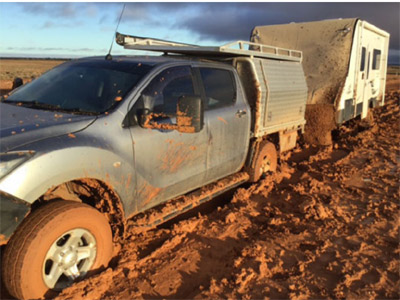
Grey nomads Kevin and Helen Barry showed their resilience after becoming bogged on a dirt track.
Despite the fact that the stereotypical grey nomad is often lambasted because of their supposed slow driving, or their ‘budget-conscious’ approach to travel, or whatever else it might be, most people would also admit to having a grudging respect for these mature-aged adventurers.
It’s no mean feat to be in your 50s, 60s, 70s, 80s or beyond – and not necessarily in perfect physical health – and still be game enough to hit the open road.
Driving a big rig into truly remote parts of Australia; and doing so with no clear idea of where you are going to sleep that night is not for the faint-hearted … and it’s not something that many people decades younger would be comfortable with.
Academics like Dr Donell Holloway from Edith Cowan University, have been struck by this inherent resilience.
She said grey nomads “have similar health outcomes to other Australian retirees but are seemingly resilient, adapting to the ongoing frailties of their ageing bodies in order to carry on touring for as long as possible”.
Other research seems to suggest that older travellers’ willingness to confront challenges and to react to potential difficulties is something created from experience, which explains where the phrase ‘what doesn’t kill you makes you stronger’ comes from.
“People who have experienced a moderate amount of adversity in their life tend to be the ones who have higher levels of wellbeing, respond better to setbacks and are more resilient in general,” said Brock Bastian, a psychology professor at Melbourne University. “Too much stress is not good, but neither is too little.”
Professor Bastian said those who cope best view stressful situations as a challenge, an opportunity for growth.
“If you’re going to deal with a challenge life has thrown at you, the worst thing you can do is see it as purely a negative thing that’s bringing you down — it makes it much harder to cope with,” he said. “Instead, it’s important to take stock of what resources you might have and ‘lean in’ to the difficulty.”
Of course, we experienced a whole lot of social changes in our lives from our childhoods in the 60s to our 60s in the 2020s. And nobody gave us anything to adapt to it or to get where we are. We had to overcome, problem solve and weather it all our lives. We are grateful to be here.
Yes we didn’t have child care we looked after our own kids. We paid our house off at 16 to18 % interest. We were not bailed out or propped up by the government every time things got a bit tough. We had to budget or go without . That is what makes us resilient nothing else.
We tend to nut things out ourselves.
Its pretty easy to see why grey nomads are so resilient, we havent been brought up with someone babying us.We didnt have the dole or child support, if there was no work where we lived we travelled to it Most of us paid houses off at 16-18% and scrimped and saved to do so. We went without not having floor coverings or nice furniture till later in life.If something went wrong we dealt with it,we didnt blame someone or something, we just got on with it and we made do with what we had.That is why we are so resilient. Stevo
As a baby boomer I was brought up in a household that consisted of Mum, Dad, Grandmother and two brothers. Dad took 4 years to build the family home part time. My family could not afford Private schooling, Television, a car ( let alone two) a house with 4 bedrooms, double garage and swimming pool and central heating. As a middle class family we boys were not afforded the luxury of a University ‘humanities” education. We had to work for what ever we had. We even rode our bikes to school, scouts and sporting events. I worked through my school years as a morning paper boy and later as a milkman before heading off for a day at school followed by 4 hours of night school. At the age of 18 I was fortunate to be offered an Apprenticeship. And yes I survived very well. Unlike kids today we were a generation that stopped being spoon fed at 3 years of age.
Statistically I doubt it, but boy, don’t I admire the oldies (ANYone over my 76yrs) for staying on the road.. and more so for those who get off it